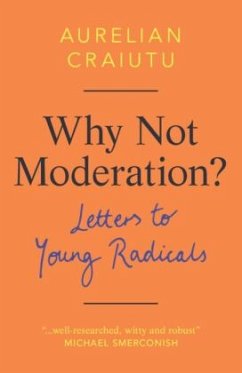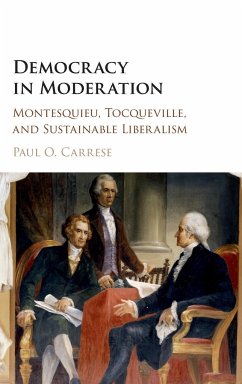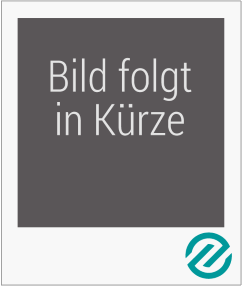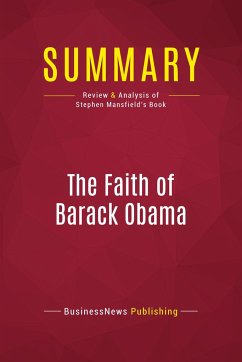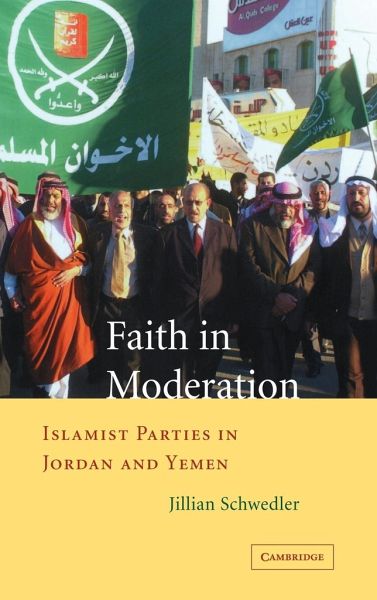
Faith in Moderation
Islamist Parties in Jordan and Yemen
Versandkostenfrei!
Versandfertig in 1-2 Wochen
111,99 €
inkl. MwSt.
Weitere Ausgaben:

PAYBACK Punkte
56 °P sammeln!
This book addresses whether Islamist groups are a threat to democratization.Does political inclusion produce ideological moderation? Schwedler argues that examining political behaviour alone provides insufficient evidence of moderation because it leaves open the possibility that political actors might act as if they are moderate while harbouring radical agendas. Through a comparative study of the Islamic Action Front party in Jordan and the Islah party in Yemen, she argues that the IAF in Jordan has become more moderate through participation in pluralist political processes, while the Islah pa...
This book addresses whether Islamist groups are a threat to democratization.
Does political inclusion produce ideological moderation? Schwedler argues that examining political behaviour alone provides insufficient evidence of moderation because it leaves open the possibility that political actors might act as if they are moderate while harbouring radical agendas. Through a comparative study of the Islamic Action Front party in Jordan and the Islah party in Yemen, she argues that the IAF in Jordan has become more moderate through participation in pluralist political processes, while the Islah party has not. The variation is explained in part by internal group organization and decision-making processes, but particularly by the ways in which the IAF has been able to justify its new pluralist practices on Islamic terms while the Islah party has not. Based on nearly four years of field research in Jordan and Yemen, Schwedler contributes both an important theory of ideological moderation and detail about these powerful Islamist political parties.
Review quote:
"Jillian SchwedlerÂ’s book provides a valuable and highly knowledgeable contribution at a time when the topic is thrust upon us with ever greater urgency: the subtle interrelationship between Islamist movements, democratization and moderation. Her analysis is informed and nuanced and reflects many years of experience on this issue. Her treatment of the important, but much less well known case of democracy in Yemen is of particular value." Graham E. Fuller, author of The Future of Political Islam
"Faith in Moderation is an unusually good work of comparative social analysis, combining theoretical sophistication, impressive depth of original research, and important new thinking about an issue of urgent international concern. Schwedler's arguments about Islamist participation in democratic institutions will challenge conventional wisdom on both sides of the debate, and become a touchstone for debates about the prospects for engaging with moderate Islamism." Marc Lynch, Williams College
"Faith in Moderation is an important and timely book. Schwedler delves deep into theory and history to provide a serious and in depth examination of the causal relationship between inclusion and moderation at a time when the prospect of political reform in the Middle East has put to question all manner of assumptions about relation of Islamism to democracy. Theoretically rich and based on detailed evidence from two case studies, this book provides a compelling analysis of Islamist debates on democracy and inclusion, and the impact of democratization on Islamism. It puts to test widely-held assumptions and presents new hypotheses for explaining Islamist behavior. Few works have so seamlessly related the study of Islam and the Middle East to comparative politics theory as this book. Written with authority and yet in a lucid style Faith in Moderation is easily one of the most notable recent contributions to the study of Islamism, democratization theory and the religion and politics." Vali Nasr, Naval Postgraduate School and author of Islamic Leviathan: Islam and the Making of State Power
"Highly recommended." -- Choice
Table of contents:
1. Moderation and the dynamics of political change; 2. Political liberalization as a mechanism of control; 3. Public political space; 4. Cultural dimensions of political contestation; 5. Justification and moderation; 6. Conclusion: does inclusion lead to moderation?
Does political inclusion produce ideological moderation? Schwedler argues that examining political behaviour alone provides insufficient evidence of moderation because it leaves open the possibility that political actors might act as if they are moderate while harbouring radical agendas. Through a comparative study of the Islamic Action Front party in Jordan and the Islah party in Yemen, she argues that the IAF in Jordan has become more moderate through participation in pluralist political processes, while the Islah party has not. The variation is explained in part by internal group organization and decision-making processes, but particularly by the ways in which the IAF has been able to justify its new pluralist practices on Islamic terms while the Islah party has not. Based on nearly four years of field research in Jordan and Yemen, Schwedler contributes both an important theory of ideological moderation and detail about these powerful Islamist political parties.
Review quote:
"Jillian SchwedlerÂ’s book provides a valuable and highly knowledgeable contribution at a time when the topic is thrust upon us with ever greater urgency: the subtle interrelationship between Islamist movements, democratization and moderation. Her analysis is informed and nuanced and reflects many years of experience on this issue. Her treatment of the important, but much less well known case of democracy in Yemen is of particular value." Graham E. Fuller, author of The Future of Political Islam
"Faith in Moderation is an unusually good work of comparative social analysis, combining theoretical sophistication, impressive depth of original research, and important new thinking about an issue of urgent international concern. Schwedler's arguments about Islamist participation in democratic institutions will challenge conventional wisdom on both sides of the debate, and become a touchstone for debates about the prospects for engaging with moderate Islamism." Marc Lynch, Williams College
"Faith in Moderation is an important and timely book. Schwedler delves deep into theory and history to provide a serious and in depth examination of the causal relationship between inclusion and moderation at a time when the prospect of political reform in the Middle East has put to question all manner of assumptions about relation of Islamism to democracy. Theoretically rich and based on detailed evidence from two case studies, this book provides a compelling analysis of Islamist debates on democracy and inclusion, and the impact of democratization on Islamism. It puts to test widely-held assumptions and presents new hypotheses for explaining Islamist behavior. Few works have so seamlessly related the study of Islam and the Middle East to comparative politics theory as this book. Written with authority and yet in a lucid style Faith in Moderation is easily one of the most notable recent contributions to the study of Islamism, democratization theory and the religion and politics." Vali Nasr, Naval Postgraduate School and author of Islamic Leviathan: Islam and the Making of State Power
"Highly recommended." -- Choice
Table of contents:
1. Moderation and the dynamics of political change; 2. Political liberalization as a mechanism of control; 3. Public political space; 4. Cultural dimensions of political contestation; 5. Justification and moderation; 6. Conclusion: does inclusion lead to moderation?





